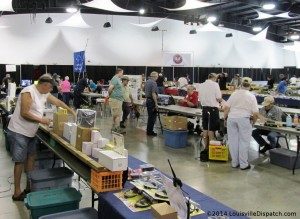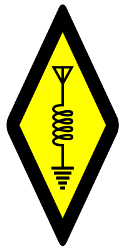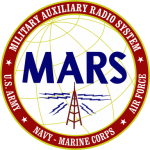 Imagine being able to talk to someone across town or on the other side of the planet – without cell phones, internet or any other infrastructure. That is the power of amateur radio and it is a hobby that is going strong in the Kentuckiana area.
Imagine being able to talk to someone across town or on the other side of the planet – without cell phones, internet or any other infrastructure. That is the power of amateur radio and it is a hobby that is going strong in the Kentuckiana area.
Once a year, in September, amateur radio – also called ham radio – enthusiasts from around the region converge on Shepherdsville for the Greater Louisville Hamfest. The annual one-day gathering features radio demonstrations, lectures, license testing, a swap meet and more.
Often seen as “old fashioned,” ham radio is anything but. While the basic science behind radio operation has not changed, technological advances have ensured that amateur radio stays in the modern age with computer-controlled radios, digital modes to transmit data, slow-scan television, and GPS location tracking. Radio amateurs even have the ability to communicate with the ultra-high tech International Space Station (ISS). While most of these things can be accomplished without relying on any infrastructure, some of the newest advances allow radio transmissions to be routed through the internet, letting licensed operators converse with others around the world using only a small hand-held radio communicating with a local internet-connected base station.
 So, why do people bother with amateur radio in the age of cell phones, instant messaging and email or when unlicensed CB radios or off-the-shelf two-way radios are available? Radio amateurs often cite many reasons, including more flexibility and options for equipment, far greater power (1500 watts versus the 1 or 4 watt limits on FRS and CB radios), and better regulation that greatly cuts down on rude or profane behavior on the air.
So, why do people bother with amateur radio in the age of cell phones, instant messaging and email or when unlicensed CB radios or off-the-shelf two-way radios are available? Radio amateurs often cite many reasons, including more flexibility and options for equipment, far greater power (1500 watts versus the 1 or 4 watt limits on FRS and CB radios), and better regulation that greatly cuts down on rude or profane behavior on the air.
Amateur radio is just a hobby for many, serving as an outlet for them to socialize on the airwaves, hone their technical expertise or participate in contests to see how many others they can contact and from how far (a practice called DX-ing). For others, the amateur radio service serves a more practical purpose such as simply navigating around traffic jams. Radio amateurs are often called upon to help coordinate large events such as outdoor races or parking at events like Kentucky Derby festivities.
Sometimes, amateur radio plays an even more important role, providing a lifeline for outdoor enthusiasts who roam far from the nearest cell tower, allowing trained weather spotters to inform the National Weather Service of severe weather through programs like SKYWARN, and to help in emergency situations through outfits like Amateur Radio Emergency Services (ARES) and Radio Amateur Civil Emergency Services (RACES). The Military Auxiliary Radio System, or MARS, is a Department of Defense sponsored civilian auxiliary consisting primarily of licensed amateur radio operators who are assist the military with communications on a local, national, and international basis.
Although amateur radio allows licensed operators to connect with others around the world, there is a largely local aspect to it. Local clubs like the Amateur Radio Transmitting Society (ARTS) of Louisville or the Bullitt Amateur Radio Society (BARS) provide opportunities to socialize with others in the hobby while exchanging knowledge and equipment and participating in club events. There are a number local scheduled on-the-air chats, called nets. The Amateur Radio Kentuckiana website lists a number of local nets, repeaters and license training and testing resources – as amateur radio is regulated by the Federal Communications Commission (FCC) and requires a license.
To learn more about this fun and practical tech hobby, visit the website above, contact a local club, or check out the Amateur Radio Relay League (ARRL), the national organization for radio amateurs, which is in its 100th year.
 Weather
Weather Traffic
Traffic @LouisvilleDispatch
@LouisvilleDispatch @LouisvilleDisp
@LouisvilleDisp Subscribe
Subscribe
Leave a Reply